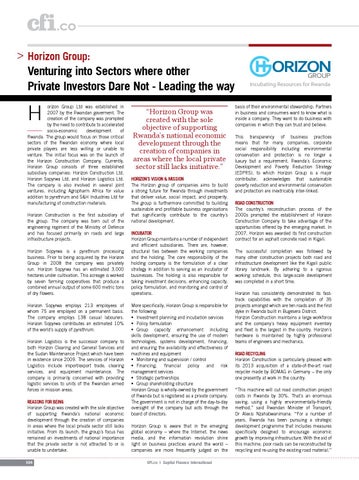> Horizon Group:
Venturing into Sectors where other Private Investors Dare Not - Leading the way
H
orizon Group Ltd was established in 2007 by the Rwandan goverment. The creation of the company was prompted by the need to contribute to accelerated socio-economic development of Rwanda. The group would focus on those critical sectors of the Rwandan economy where local private players are less willing or unable to venture. The initial focus was on the launch of the Horizon Construction Company. Currently, Horizon Group consists of three established subsidiary companies: Horizon Construction Ltd, Horizon Sopyrwa Ltd, and Horizon Logistics Ltd. The company is also involved in several joint ventures, including Agropharm Africa for value addition to pyrethrum and S&H Industries Ltd for manufacturing of construction materials. Horizon Construction is the first subsidiary of the group. The company was born out of the engineering regiment of the Ministry of Defence and has focused primarily on roads and large infrastructure projects. Horizon Sopyrwa is a pyrethrum processing business. Prior to being acquired by the Horizon Group in 2008 the company was privately run. Horizon Sopyrwa has an estimated 3,000 hectares under cultivation. This acreage is worked by seven farming cooperatives that produce a combined annual output of some 600 metric tons of dry flowers. Horizon Sopyrwa employs 213 employees of whom 75 are employed on a permanent basis. The company employs 138 casual labourers. Horizon Sopyrwa contributes an estimated 10% of the world’s supply of pyrethrum. Horizon Logistics is the successor company to both Horizon Clearing and General Services and the Sudan Maintenance Project which have been in existence since 2009. The services of Horizon Logistics include import/export trade, clearing services, and equipment maintenance. The company is primarily concerned with providing logistic services to units of the Rwandan armed forces in mission areas. REASONS FOR BEING Horizon Group was created with the sole objective of supporting Rwanda’s national economic development through the creation of companies in areas where the local private sector still lacks initiative. From its launch, the group’s focus has remained on investments of national importance that the private sector is not attracted to or is unable to undertake. 104
“Horizon Group was created with the sole objective of supporting Rwanda’s national economic development through the creation of companies in areas where the local private sector still lacks initiative.” HORIZON’S VISION & MISSION The Horizon group of companies aims to build a strong future for Rwanda through investments that deliver value, social impact, and prosperity. The group is furthermore committed to building sustainable and profitable business organisations that significantly contribute to the country’s national development. INCUBATOR Horizon Group maintains a number of independent and efficient subsidiaries. There are, however, structural ties between the working companies and the holding. The core responsibility of the holding company is the formulation of a clear strategy in addition to serving as an incubator of businesses. The holding is also responsible for taking investment decisions, enhancing capacity, policy formulation, and monitoring and control of operations. More specifically, Horizon Group is responsible for the following: • Investment planning and incubation services • Policy formulation • Group capacity enhancement including skills development, ensuring the use of modern technologies, systems development, financing, and ensuring the availability and effectiveness of machines and equipment • Monitoring and supervision / control • Financing, financial policy and risk management services • Strategic partnerships • Group shareholding structure Horizon Group is wholly-owned by the government of Rwanda but is registered as a private company. The government is not in charge of the day-to-day oversight of the company but acts through the board of directors. Horizon Group is aware that in the emerging global economy – where the Internet, the news media, and the information revolution shine light on business practices around the world – companies are more frequently judged on the CFI.co | Capital Finance International
Incubating Resources for Rwanda
basis of their environmental stewardship. Partners in business and consumers want to know what is inside a company. They want to do business with companies in which they can trust and believe. This transparency of business practices means that for many companies, corporate social responsibility including environmental conservation and protection is no longer a luxury but a requirement. Rwanda’s Economic Development and Poverty Reduction Strategy (EDPRS), to which Horizon Group is a major contributor, acknowledges that sustainable poverty reduction and environmental conservation and protection are inextricably inter-linked. ROAD CONSTRUCTION The country’s reconstruction process of the 2000s prompted the establishment of Horizon Construction Company to take advantage of the opportunities offered by the emerging market. In 2007, Horizon was awarded its first construction contract for an asphalt concrete road in Kigali. The successful completion was followed by many other construction projects both road and infrastructure development like the Kigali public library landmark. By adhering to a rigorous working schedule, this large-scale development was completed in a short time. Horizon has consistently demonstrated its fasttrack capabilities with the completion of 35 projects amongst which are ten roads and the first dyke in Rwanda built in Bugesera District. Horizon Construction maintains a large workforce and the company’s heavy equipment inventory and fleet is the largest in the country. Horizon’s hardware is maintained by highly professional teams of engineers and mechanics. ROAD RECYCLING Horizon Construction is particularly pleased with its 2013 acquisition of a state-of-the-art road recycler made by BOMAG in Germany – the only one presently at work in the country. “This machine will cut road construction project costs in Rwanda by 30%. That’s an enormous saving, using a highly environmentally-friendly method,” said Rwandan Minister of Transport, Dr Alexis Nzahabwanimana: “For a number of years, Rwanda has been pursuing a strategic development programme that includes measures specifically designed to encourage economic growth by improving infrastructure. With the aid of this machine, poor roads can be reconstructed by recycling and re-using the existing road material.”
